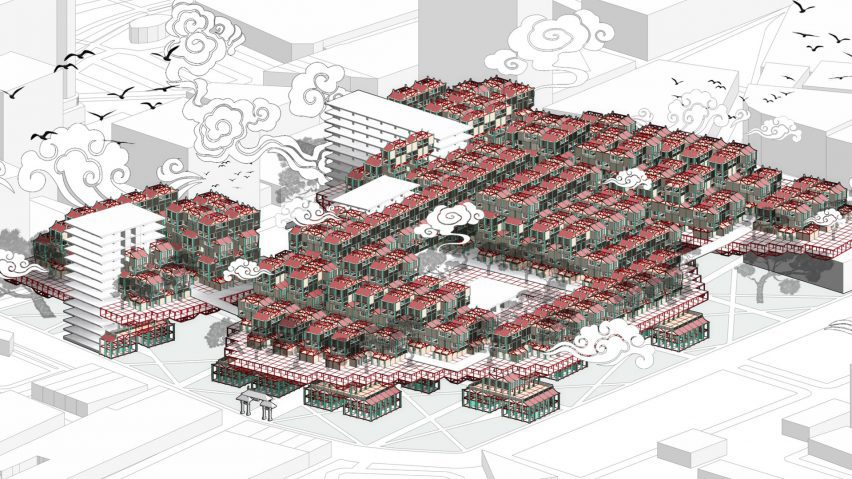
Ten thesis projects by students at Singapore University of Technology and Design
Dezeen School Shows: a project that uses generative AI to enhance theatre performances is included in Dezeen's latest school show by students at the Singapore University of Technology and Design.
Also featured is the design of a chair that aims to facilitate communal dining among citizens of Singapore and the design of a floating structure for growing crops on Cambodia's Mekong River.
Singapore University of Technology and Design (SUTD)
Institution: Singapore University of Technology and Design (SUTD)
Course: Master of Architecture – Architecture and Sustainable Design pillar
Tutors: Peter Ortner, Daniel Whittaker, Carlos Bañón, Eva Castro, Immanuel Koh, Jason Lim, Bige Tunçer, Christine Yogiaman and Zheng Kai
School statement:
"Spanning from Jakarta to Kuala Lumpur, Singapore to Hai Phong, these thesis projects mark the apex of architecture and sustainable design education at the Singapore University of Technology and Design.
"Emblematic of rigorous research conducted on-site and in the field (or in a mangrove swamp), these students have embarked upon an architectural journey which has led them to examine in what ways future architectural, urban design and landscape ecologies will assist in securing new communities, focused upon a bio- and socio-centric architectural core.
"These students have envisioned a new architecture which enhances the lives of fishermen in Cambodia, young and old families maturing in Singapore, and responsible energy-harvesting in the South China Sea.
"Together, these jury-selected and award-winning projects represent the best in new architectural ideas, demonstrating the exceptional design talents of our graduating students this December 2023.
"SUTD Master of Architecture graduate students are trailblazers creating a better world through design."
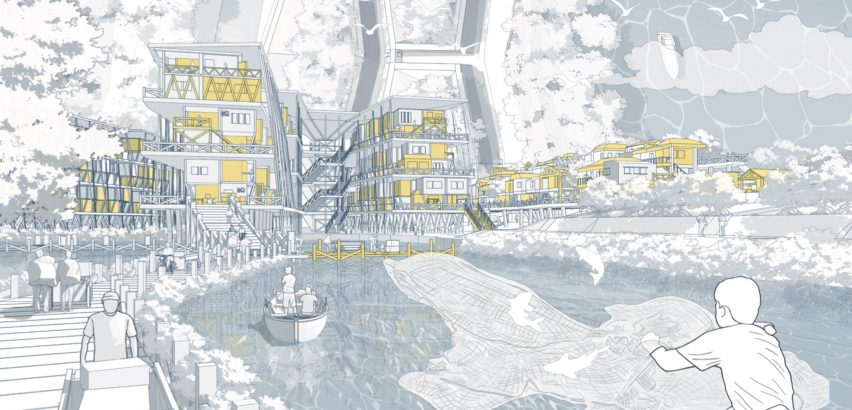
Jakarta, Indonesia's Possibilities for Coastal Reform: Muara Angke 2100 by Lyvia Anabelle Simano
"Simano's thesis aims to enhance North Jakarta's resilience against rising water levels through 'natural' coastal protection methods while adding value to the city and its constituent neighbourhoods.
"The following question was posed: 'What kind of new, durable infrastructure could be designed, to create an urban-nature balance?'.
"Simano focused upon a Jakartan port-neighbourhood called Muara Angke, creating a solution of a new multi-phase implementation of dike rings as an archipelago strategy.
"Simano's island-channel solution changed water threats into an opportunity for coexistence, by adding huge plantations of mangrove trees as a new brackish water aquaculture farm to help absorb inflows during rising floodwater conditions."
Student: Lyvia Anabelle Simano
Tutors: Peter Ortner and Carlos Bañón
Award: The Master of Architecture Thesis Award – Sustainable Environments
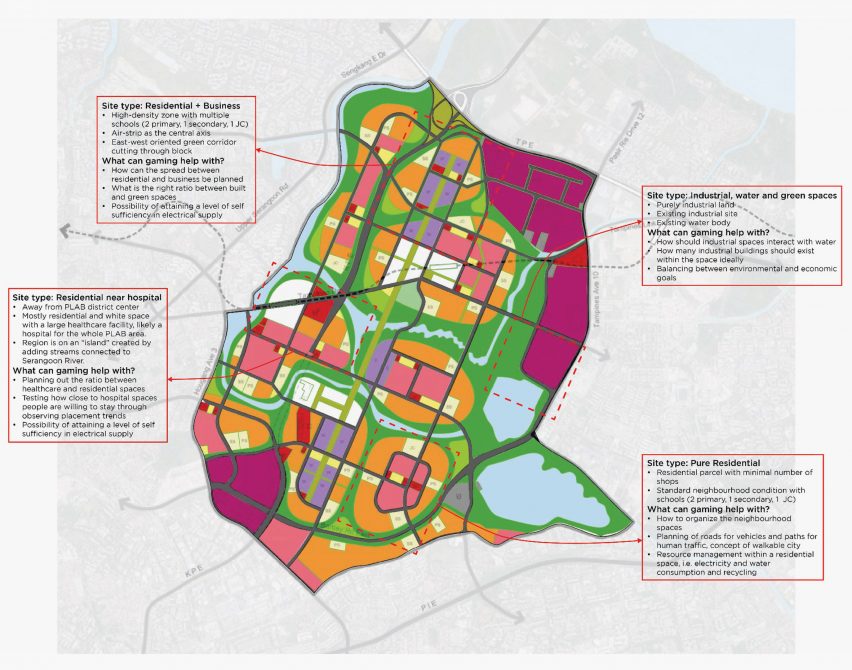
Virtual Net-Zero: Participatory Design in the Redevelopment of Paya Lebar Air Base in Singapore by Ryan Chua Jie Jian
"Jian's thesis delves deep into the following question: How can we achieve real net-zero planning through the use of participatory design methods (involving the community) to create new digital and virtual technological tools to simulate various self-sufficiency energy use goals?
"This complex digital framework achieved two paramount goals. The first is to help the general public better understand the true challenges of planning a net-zero energy use neighbourhood district.
"The second is to help architects and urban planners better understand the public's perception of what constitutes a 'net-zero city' and discover new design opportunities unique to the individual needs of the users."
Student: Ryan Chua Jie Jian
Tutors: Peter Ortner and Carlos Bañón
Award: The Master of Architecture Thesis Award – Sustainable Environments
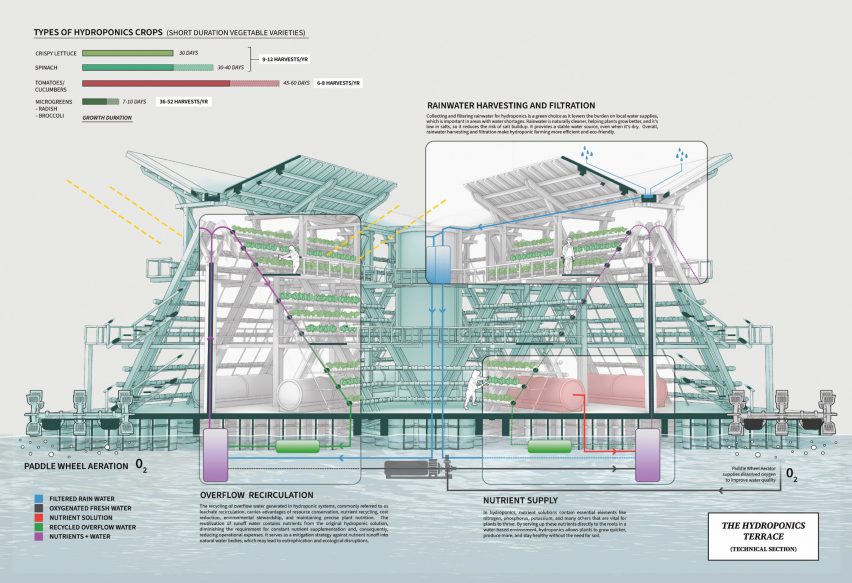
The Commons Cooperative: Sustaining the Commonwealth in Tonlé Sap in Cambodia by Ian Chung Enzhi
"Enzhi's thesis proposes the need for a communitarian effort, capable of progressing rural food production in the Mekong River basin flood plain.
"His buoyant architectural solution moves three villages towards a responsible socio-eco paradigm, which values the symbiotic cooperation between humanity and nature, enabling increased productivity of the ecosystem and restoration of local livelihoods.
"Enzhi focused on three villages: Chong Khneas, Kampong Phluk, Kampong Khleang, located south in Siem Reap province.
"His thesis investigates a new floating architectural village solution, existing in the context of the ebb and flow of the Tonlé Sap lake and flood plain."
Student: Ian Chung Enzhi
Tutor: Daniel Whittaker
Award: The Master of Architecture Thesis Award – Praxis Innovation, The Master of Architecture Thesis Award – Best Representation and The Daniel Libeskind Award
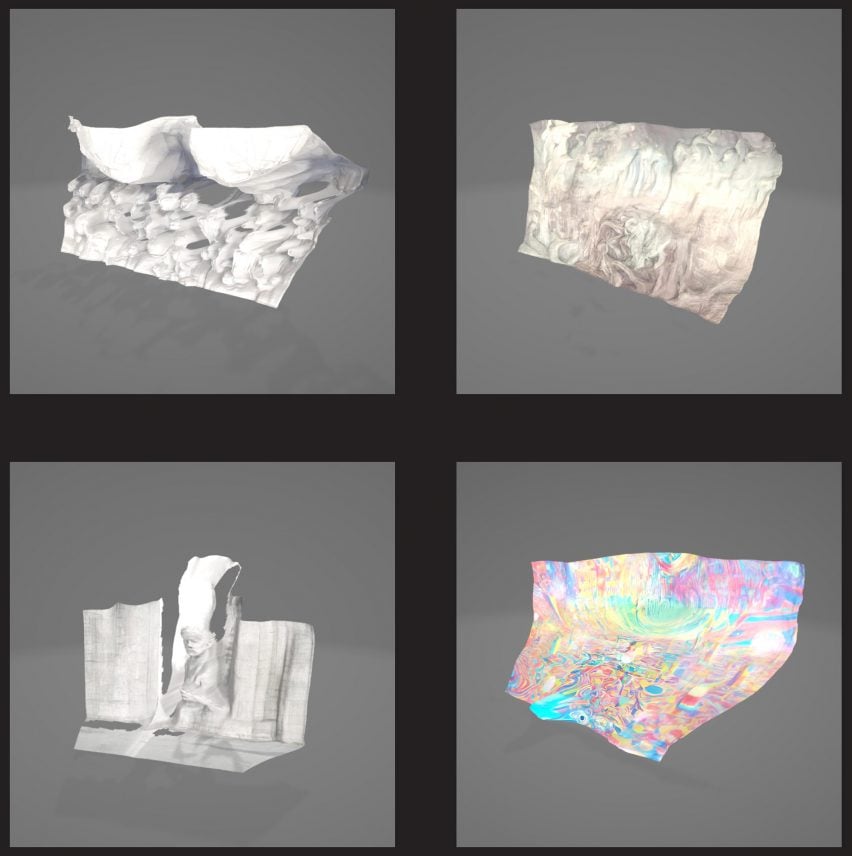
The Theatre Machine by Saw Man Lin
"Saw's thesis harnesses the potential of generative AI to orchestrate spatial storytelling for the poignant 'to be or not to be' soliloquy from Shakespeare's Hamlet.
"The objective is to integrate an actor's interpretive performance with spaces that serve as a co-narrator, resulting in an audio-visual rendition of the soliloquy.
"Lin's orchestration of the digital space yields a performance that reveals the relationship between the actor and the space.
"The methodological harnessing of generative AI disrupts the conventional live-staging paradigm challenging the linear trajectory intrinsic to traditional theatrical experiences.
"This thesis reevaluates the storytelling-actor-space relationship dynamic."
Student: Saw Man Lin
Tutor: Immanuel Koh
Award: The Master of Architecture Thesis Award – Design Computation and The Master of Architecture Thesis Award – Future Manufacturing
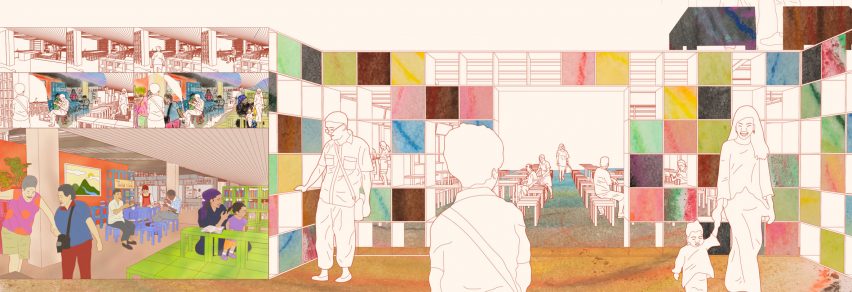
Singapore's Hawker Centres: The Habitation of Purpose and Community for Elders by Mark Tay Hao Yang
"Yang investigates the reform of the family dining table, re-contextualised in Singapore's contemporary Hawker Centre communal food culture.
"His thesis asks how the surgical insertion of the chair can act as a catalyst to allow elders to exercise their agency and connect with others in the community.
"Yang's architectural intervention of a newly-designed wooden chair, augmented with hand-painted planar elements, created by community members, will form strong new relations in the Hawker Centre.
"It will become a place-making tool and preserve the familiarity and habitual usage, which continues to draw Singaporeans from all walks of life to communally dine together."
Student: Mark Tay Hao Yang
Tutors: Jason Lim, Bige Tunçer, Christine Yogiaman and Zheng Kai
Award: The Master of Architecture Thesis Award – Social Innovation
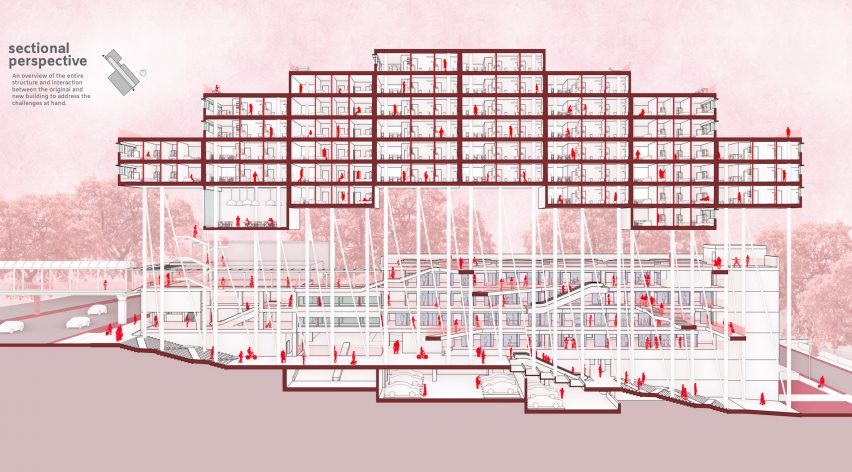
Revitalising and Reinvigorating Neglected Strata Malls in Singapore by Janice Yong Qi Hui
"Hui examined ageing 1970s and 1980s multi-story and proprietor-owned shopping 'strata malls' in Singapore.
"Her thesis sought to revitalise these sometimes forgotten indoor spaces, pursuing a variety of adaptive reuse options, to inject new life into the buildings so they remain relevant to their neighbouring communities into the 21st century.
"Hui's thesis focused on the Upper Serangoon Shopping Center, whose relevance has dissipated as the community aged and less young families utilised its interior atrium spaces.
"Hui discerned five evaluative performance criteria: connectivity, competition, visibility, en vogue style/management and adaptability for alteration, as governing her dynamic and promising re-design of Upper Serangoon."
Student: Janice Yong Qi Hui
Tutors: Peter Ortner and Carlos Bañón
Award: Honorary project award
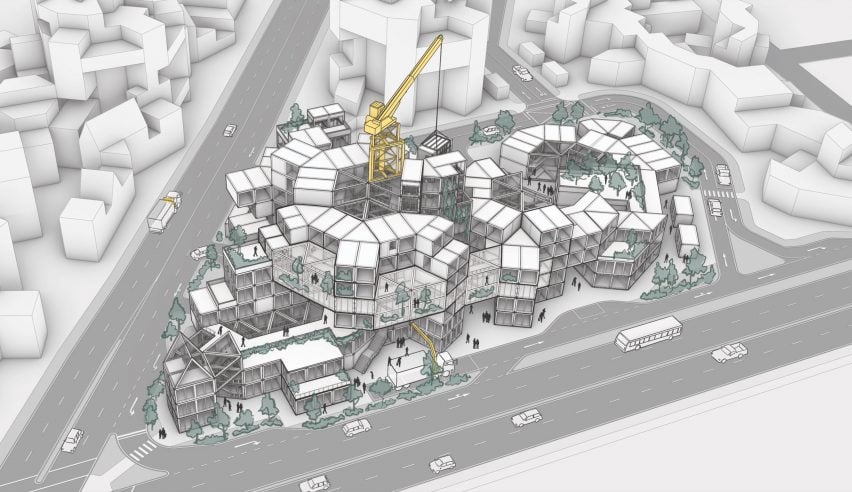
Normalising Change: The (in)Complete City – (re)constructing Singapore by Kuan Yi Heng
"Heng analysed the 1960s and 1970s Japanese notion of the Metabolist city and thus synthesised a thesis project that proposes a construction system that allows buildings to morph and change in function and form over time to adapt to changing socioeconomic demands.
"Heng designed a robust construction system that facilitates the assembly and disassembly of building parts and injects sustainability cycles into the construction industry in a multi-tiered fashion.
"The project defines successful modular building design, taking into account fabrication, shipping, assembly and use, as well as disassembly and re-use."
Student: Kuan Yi Heng
Tutors: Peter Ortner and Carlos Bañón
Award: Honorary project award
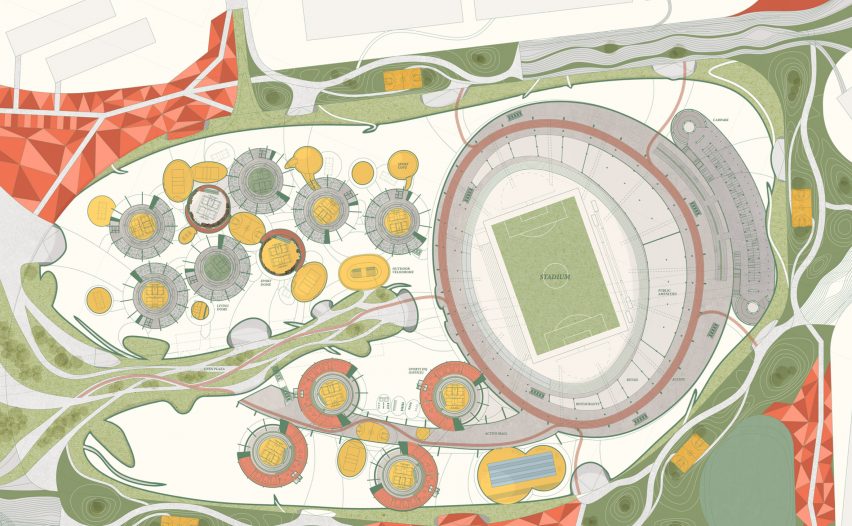
The Urban Sporting Village: Aspiring to an Active Living! by Rachel Cheah Jiawen
"Jiawen examined a range of contemporary urban health issues resulting from sedentary living.
"From this detailed analysis of modern-day transit systems, Jiawen designed a new urban mobility framework with hubs that accommodate the varying rhythms of individuals, creating an environment that supports both fast and leisurely activities.
"These hubs also act as a social exchange area where people can choose to participate in sports or access relaxing green spaces, which support different speeds of activity for a wide variety of age group demographics.
"'Living Domes' and 'Sports Domes', with elliptical oculi, welcome filtered natural daylight into activity arenas sustained with natural ventilation."
Student: Rachel Cheah Jiawen
Tutors: Peter Ortner and Carlos Bañón
Award: Honorary project award

Cryptosphere: A new energy currency for sustainable consumption in Vietnam by Valent Tan Wei Ren
"Ren's thesis examines the energy conundrum: the complex system of global energy demand amidst continual climate change in developing countries.
"His thesis proposes a South China Sea coastal settlement, near Hai Phong, Vietnam, where a new automated energy creation future is envisioned for 2050.
"Ren's thesis challenges the current economic energy production model by exploring a new 'decentralised autonomous organisation' (DAO) to regulate energy consumption by the producers and consumers, turning energy into a new currency.
"This energy is created in a three-fold technological manner: sea waves, vertical architecturally-integrated ferrous oxide batteries and gaseous buoyant balloons all working generatively together."
Student: Valent Tan Wei Ren
Tutor: Eva Castro
Award: The Master of Architecture Thesis Award – Research Innovation and The DP Architects Design Excellence Award
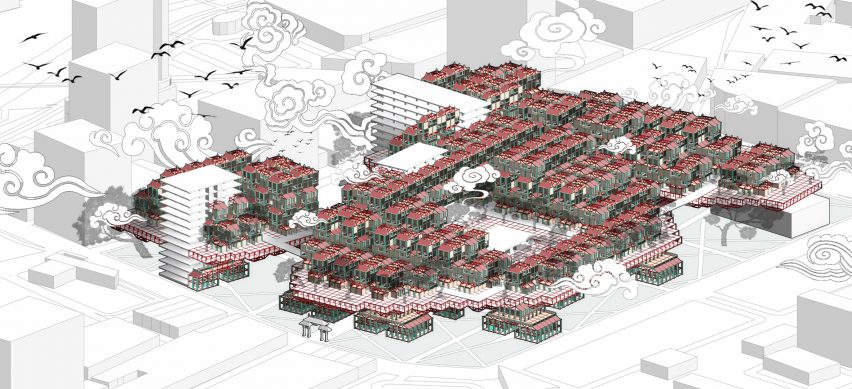
Heteritopolis: A Critique on Conservation of China Town’s Heritage in Kuala Lumpur, Malaysia by Tan Eng Khang
"Khang ventured into the depths of Kuala Lumpur's densely-packed historic China Town, dissecting long-held traditions regarding historic building conservation.
"His thesis project critiqued the conventional isolated approach to preserving individual old shop houses.
"Khang created a new architectural-structural form moving a new coherent approach, on tiered platforms, into a vertical China Town.
"Khang reintroduced cooperative housing for both residents and transient tourists alike, centring this new residential focus as an integral design stratagem that ensures Kuala Lumpur's future urban sustainability.
"This he designed as guaranteeing the permanence of evolving heritage for past, current and future generations to inhabit."
Student: Tan Eng Khang
Tutor: Daniel Whittaker
Award: Honorary project award
Partnership content
This school show is a partnership between Dezeen and Singapore University of Technology and Design. Find out more about Dezeen partnership content here.